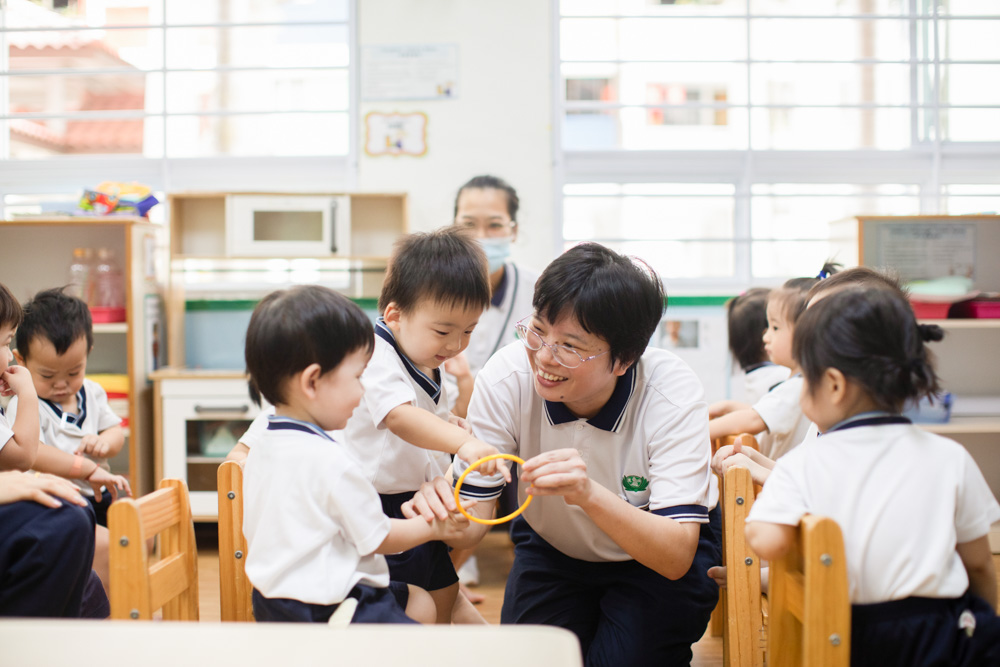Tea appreciation class instructor Yan Su-Yuan (centre) guides the children in their observations on the changes the tea undergoes after steeping. Photo by Nichelle Chan
“Clean our hands and hearts, and anew we start.”
As Tzu Chi’s tea appreciation instructor carefully poured water from a scoop onto the little children’s hands, her co-instructor followed up by gently wiping their hands dry with a cloth. Even before they have stepped into the doorway of the Tzu Chi Great Love PreSchool, the care with which the lesson had been planned out was evident to all.
Tea appreciation instructor pours water over the children’s hands with a scoop while another instructor gently wipes their hands dry. Photo by Nichelle Chan
Since April 2016, Tzu Chi Foundation (Singapore) has been conducting flower arrangement and tea appreciation classes for the five and six year olds at the Tzu Chi Great Love PreSchool twice monthly. The hour long classes aim to teach the children social etiquette and the appropriate manner of interacting with others.
One’s Very First Cup of Tea
Apart from a display of the various types of tea leaves in the classroom, the instructor also invited the children to smell the fragrance of the tea, touch the leaves and appreciate the various shapes they came in. Many of the children for whom it was the first time handling tea leaves, exclaimed in delight at the pleasant fragrance.
The instructor also employed the use of teaching aids to share the story of tea, captivating the attention of her audience. The tea-making utensils selected for use were transparent, so that the students could carefully observe the leaves gradually unfurling after being steeped in hot water.
Tea instructor Yan Su-Yuan told them: “The first thing to do is to inhale the fragrance (of the tea) upon picking up the cup, then we should drink ‘the tea of three good things’.”
“A cup should be drunk in three sips. Come, let us review this together!”
“Speak good words!” chorused her students in unison.
She received the enthusiastic replies she was looking for, as the children went on to list “think good thoughts” and “do good deeds” as the second and third of the “three good things.” Happy at the responses received, the instructors nodded and smiled.
Before the class, most of the children’s understanding of “tea” was limited to the local beverage of chrysanthemum tea. After they had tasted their first mouthful of tea, some described it as being fragrant, while others declared that it didn’t taste sweet.
Using the appropriate learning materials, the instructor shares the story of tea with the class who listens in rapt attention. Photo by Nichelle Chan
One’s First Basket of Flowers
Carnations, baby’s breath, orchids, and green leaves decorate the wood-themed classroom tastefully during the flower arrangement class.
“Let’s express our gratitude (to Mother Earth for providing us with) these plant materials to learn with.” Before the class started, instructor Zhang Xiu Qin inculcated the virtue of having a grateful heart in her students. She also reminded them to place their scissors gently on the table with respect.
Following their instructor’s lead, the children carefully trimmed the flowers and stuck them into their respective holders. In the process, they learned to treat plants with respect. Zhang likened each flower holder to houses, with every individual flower a member of the family. She told the children that the flowers had to return to their homes, and their colours must complement each other. With her words in mind, the children started thinking of filling their holders with a “father,” “mother,” “grandpa” and “grandma.”
“Don’t you think ‘father’ is rather tall?” “Oh, beautiful, you work so quickly!” Zhang stood by their side and did not let up on her encouraging words. She discovered that some of her students had a flair for flower arrangement.
“I have many colours; this is my ‘grandpa,’ and this is my ‘grandma,’” said a child happily. Huang Yu Xuan even gave a flower basket to the instructor, sharing that she felt the flowers were so pretty and that one should not say they were not beautiful lest they die.
The children happily show off their handiwork, and some wish to gift it to their mothers for Mother’s Day. Photo by Li Xiao Ting
Tailoring Classes to the Children’s Needs
Apart from the children, the instructors, too, learnt something new from the experience. Though they had many years of teaching behind them, they still had to consider every detail carefully to pre-empt any injuries during the process as they were facing a different audience.
Yan gave the example of having to select a thicker cup that would not break even if it accidentally sustained knocks. The tea leaves were only subjected to 40 degrees water during the steeping process, and the tea itself was diluted before consumption so that the children would not have difficulty sleeping at night.
Zhang too, shared that blunt scissors were provided for the children’s use in consideration of their safety, and she was careful to ensure that they would not be pricked by the plant materials. Yan explained that the ten lessons were structured such that the origins of tea, its consumption, and the materials used in tea-making, including the proper way of handling the utensils were covered. These were all part of Tzu Chi’s humanistic culture.
“It’s most important that they learn how to love and respect what Mother Nature provides, cultivate gratitude, and recognize that everything in nature has its own beauty,” Zhang said.
With tea and flowers as a medium, Tzu Chi passes down its humanistic culture and hopes that by getting closer to the beauty in nature, the children will cherish the people and things around them more deeply.



